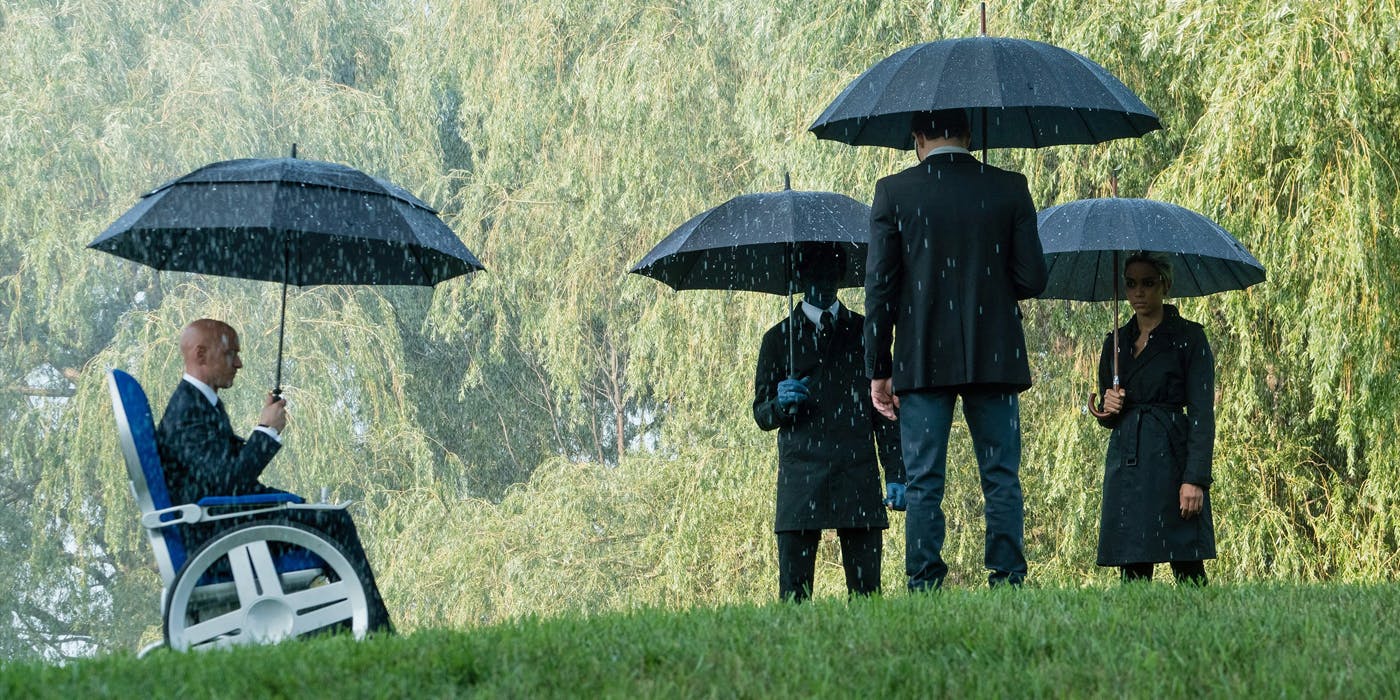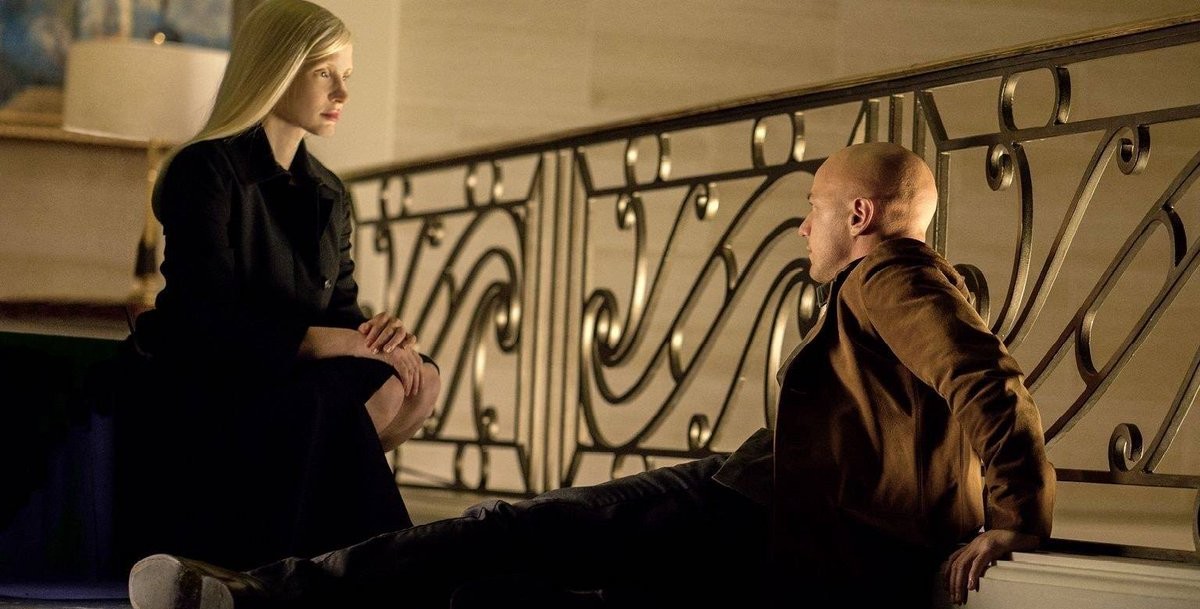X-Men: Dark Phoenix review - a grand finale | reviews, news & interviews
X-Men: Dark Phoenix review - a grand finale
X-Men: Dark Phoenix review - a grand finale
A superior remake ends the X-Universe, for now

One day, when superhero films are as rare as westerns, we will appreciate the brilliant talent applied to the best of them. X-Men: Dark Phoenix moves with a classic’s smooth conviction from its very first scenes.
X-Men is the franchise which laid the groundwork for the Marvel boom in 2000, and has been repeatedly contorted, rebooted and recast during its two decades. This is writer – and now debutant director – Simon Kinberg’s third attempt at the comics’ iconic 1980 Dark Phoenix tale, effectively remaking his own script for the studio-compromised, fan-disliked X-Men: The Last Stand (2006).
 Continuity hang-ups were binned long ago. Like Avengers: Endgame, this is simply the finest finale the series could wish for, both mythic and psychologically modern. The #MeToo movement, which sunk main X-director Bryan Singer, is accommodated to fertile effect. X-Men was always the comic for outcasts, its mutants stand-ins for oppressed sexualities and races. Now at the last, Kinberg interrogates its own gender blind-spots.
Continuity hang-ups were binned long ago. Like Avengers: Endgame, this is simply the finest finale the series could wish for, both mythic and psychologically modern. The #MeToo movement, which sunk main X-director Bryan Singer, is accommodated to fertile effect. X-Men was always the comic for outcasts, its mutants stand-ins for oppressed sexualities and races. Now at the last, Kinberg interrogates its own gender blind-spots.
Professor X (James McAvoy) has been the paternalistic head of the mutants’ improvised family, taking them into his upstate New York school, often as children. He has been a vain, untrustworthy guardian, Kinberg now suggests. Blue-skinned Raven (Jennifer Lawrence), the team’s new field leader, gives him both barrels after their outer space near-death: “And by the way, the women are always saving the men around here. You might want to think about changing the name to X-Women.” If the script seems initially overloaded with epigrams about difference and identity, it also genuinely addresses shifting gender ground.
 The film anyway belongs to Sophie Turner’s Jean Grey, whose new cosmic might makes her both menacing and tragic. The little girl of the first scene was too, and Turner’s humane performance is riven with pain and power. Freeing herself from the X-Men with terrible violence, she is spurned too by the films’ previous mutant murderer, Magneto (Michael Fassbender), falling instead into the embrace of another hugely dangerous female, the alien Smith (Jessica Chastain, pictured above with McAvoy). X-Men: Dark Phoenix thereby passes an apocalyptic Bechdel Test.
The film anyway belongs to Sophie Turner’s Jean Grey, whose new cosmic might makes her both menacing and tragic. The little girl of the first scene was too, and Turner’s humane performance is riven with pain and power. Freeing herself from the X-Men with terrible violence, she is spurned too by the films’ previous mutant murderer, Magneto (Michael Fassbender), falling instead into the embrace of another hugely dangerous female, the alien Smith (Jessica Chastain, pictured above with McAvoy). X-Men: Dark Phoenix thereby passes an apocalyptic Bechdel Test.
Fassbender, cast in 2011 to pep up a role originated by Ian McKellen, now looks weathered by the character’s wrenching changes, giving pathos to this farewell performance. Kinberg meanwhile belies his directorial inexperience, and Dark Phoenix’s huge budget, with telling intimacy. When the testosterone ratchets up as Magneto and an Army officer argue, the camera’s so close you can almost smell their breath.
The superhero pandemic may be sucking the life from other genres, making cinema-going an exclusively blockbuster affair. Perhaps streaming would always have done so. There is anyway something moving about watching believable characters behave morally on behalf of others, with adult difficulty. This is a worthy tribute to the late Stan Lee, getting his final credit here, and to a golden age of movie fantasy.
The future of Arts Journalism
You can stop theartsdesk.com closing!
We urgently need financing to survive. Our fundraising drive has thus far raised £49,000 but we need to reach £100,000 or we will be forced to close. Please contribute here: https://gofund.me/c3f6033d
And if you can forward this information to anyone who might assist, we’d be grateful.

Subscribe to theartsdesk.com
Thank you for continuing to read our work on theartsdesk.com. For unlimited access to every article in its entirety, including our archive of more than 15,000 pieces, we're asking for £5 per month or £40 per year. We feel it's a very good deal, and hope you do too.
To take a subscription now simply click here.
And if you're looking for that extra gift for a friend or family member, why not treat them to a theartsdesk.com gift subscription?
more Film
 The Perfect Neighbor, Netflix review - Florida found-footage documentary is a harrowing watch
Sundance winner chronicles a death that should have been prevented
The Perfect Neighbor, Netflix review - Florida found-footage documentary is a harrowing watch
Sundance winner chronicles a death that should have been prevented
 Blu-ray: Le Quai des Brumes
Love twinkles in the gloom of Marcel Carné’s fogbound French poetic realist classic
Blu-ray: Le Quai des Brumes
Love twinkles in the gloom of Marcel Carné’s fogbound French poetic realist classic
 Frankenstein review - the Prometheus of the charnel house
Guillermo del Toro is fitfully inspired, but often lost in long-held ambitions
Frankenstein review - the Prometheus of the charnel house
Guillermo del Toro is fitfully inspired, but often lost in long-held ambitions
 London Film Festival 2025 - a Korean masterclass in black comedy and a Camus classic effectively realised
New films from Park Chan-wook, Gianfranco Rosi, François Ozon, Ildikó Enyedi and more
London Film Festival 2025 - a Korean masterclass in black comedy and a Camus classic effectively realised
New films from Park Chan-wook, Gianfranco Rosi, François Ozon, Ildikó Enyedi and more
 After the Hunt review - muddled #MeToo provocation
Julia Roberts excels despite misfiring drama
After the Hunt review - muddled #MeToo provocation
Julia Roberts excels despite misfiring drama
 London Film Festival 2025 - Bradley Cooper channels John Bishop, the Boss goes to Nebraska, and a French pandemic
... not to mention Kristen Stewart's directing debut and a punchy prison drama
London Film Festival 2025 - Bradley Cooper channels John Bishop, the Boss goes to Nebraska, and a French pandemic
... not to mention Kristen Stewart's directing debut and a punchy prison drama
 Ballad of a Small Player review - Colin Farrell's all in as a gambler down on his luck
Conclave director Edward Berger swaps the Vatican for Asia's sin city
Ballad of a Small Player review - Colin Farrell's all in as a gambler down on his luck
Conclave director Edward Berger swaps the Vatican for Asia's sin city
 London Film Festival 2025 - from paranoia in Brazil and Iran, to light relief in New York and Tuscany
'Jay Kelly' disappoints, 'It Was Just an Accident' doesn't
London Film Festival 2025 - from paranoia in Brazil and Iran, to light relief in New York and Tuscany
'Jay Kelly' disappoints, 'It Was Just an Accident' doesn't
 Iron Ladies review - working-class heroines of the Miners' Strike
Documentary salutes the staunch women who fought Thatcher's pit closures
Iron Ladies review - working-class heroines of the Miners' Strike
Documentary salutes the staunch women who fought Thatcher's pit closures
 Blu-ray: The Man in the White Suit
Ealing Studios' prescient black comedy, as sharp as ever
Blu-ray: The Man in the White Suit
Ealing Studios' prescient black comedy, as sharp as ever
 The Woman in Cabin 10 review - Scandi noir meets Agatha Christie on a superyacht
Reason goes overboard on a seagoing mystery thriller
The Woman in Cabin 10 review - Scandi noir meets Agatha Christie on a superyacht
Reason goes overboard on a seagoing mystery thriller
 London Film Festival 2025 - crime, punishment, pop stars and shrinks
Daniel Craig investigates, Jodie Foster speaks French and Colin Farrell has a gambling habit
London Film Festival 2025 - crime, punishment, pop stars and shrinks
Daniel Craig investigates, Jodie Foster speaks French and Colin Farrell has a gambling habit

Add comment